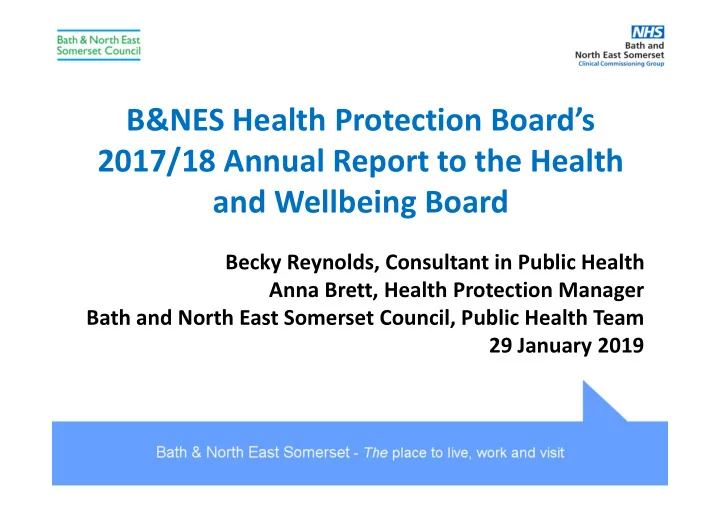

B&NES Health Protection Board’s 2017/18 Annual Report to the Health and Wellbeing Board Becky Reynolds, Consultant in Public Health Anna Brett, Health Protection Manager Bath and North East Somerset Council, Public Health Team 29 January 2019
What is Health Protection? Protecting the health of the population by improving the prevention and control of infectious diseases and other environmental threats. It includes: • infectious diseases • chemicals, poisons and radiation • emergency response • environmental health hazards
Which specialist areas does the Health Protection Board cover? Communicable Disease Healthcare Associated Control & Environmental Health Emergency Planning Infection (HCAI) Hazards Key Performance Indicators: Key Performance Indicators: Key Performance Indicators: Civil Contingencies Act MRSA, C.difficile & Ecoli Private Water Supplies & Air requirements bacteraemia Quality Management Areas Substance Misuse Screening & Immunisation Key Performance Indicators: Key Performance Indicators: Sexual Health Hep B vaccination, Hep C National screening Key Performance Indicators: testing, Opiates & Non-Opiates programmes & uptake of HIV & under 18 conceptions & Alcohol universal immunisation programmes
Progress on 2016-17 priorities that were implemented in 2017-18
Priorities that were RAG rated GREEN in 2017-18 1. Assurance: continue to monitor the performance of specialist areas, identify risks, ensure mitigation is in place and escalate as necessary 2. Support activities to slow the development and spread of antimicrobial resistance 3. Continue to ensure that the public are informed about emerging threats to health 4. Support the review, development and implementation of all Air Quality Action Plans
Continue to ensure that the public are informed about emerging threats to health
Support the review of the Bath Air Quality Action Plan and support the implementation of the actions in the Saltford & Keynsham Air Quality Actions Plans Air pollution can be harmful to everyone; however there are some factors which make some people more vulnerable.
Left: St Andrews C of E Primary School Walking Bus on 25 January 2018
Priorities that were RAG rated AMBER in 2017-18 • Continue to reduce health inequalities in screening and immunisation programmes • Improve the uptake of flu vaccinations in at risk groups, pregnant women, health and social care workers, and carers; and pneumococcal vaccination amongst under 65s at risk and over 65 year olds
Continue to reduce health inequalities in screening and immunisation programmes 12-month pilot for reducing inequalities in screening and immunisations across B&NES.
Objectives of the pilot: • Use focus groups to identify barriers and facilitators to access and completion of cervical screening for younger women. • Feasibility study looking at two interventions to improve uptake/reduce inequalities in cervical and bowel screening amongst people who have not participated in 2 rounds of screening. • Identify and share best practice from general practice on the delivery of childhood immunisations. • Develop a multi-disciplinary pilot with an early years’ provider (and GP practice) to explore innovative ways to promote vaccination uptake in Twerton • Increasing screening and childhood immunisation uptake in the Gypsy, Traveller and Boater community.
Improve the uptake of flu vaccinations in at risk groups, pregnant women, health and social care workers, and carers; and pneumococcal vaccination amongst under 65s at risk and over 65 year olds
Uptake of seasonal flu vaccination, adult programme - BANES CCG Source: ImmForm
Uptake of seasonal flu vaccination, childhood programme – BANES CCG Source: ImmForm
Uptake of seasonal flu vaccination of Health Care Workers by provider Provider Organisation Uptake (%) 2017-18 B&NES Enhanced Medical Services (BEMS) 100% BMI Bath 76.4% Circle Bath 73.0% Royal United Hospitals Bath NHS 71.6% Foundation Trust Care UK 61.3% Avon and Wiltshire Mental Health 60.7% Partnership NHS Trust (AWP) Virgin Care Services 29.7%
The following 6 priorities have been identified for 2018-19 • Assurance: continue to monitor performance of specialist areas, identify risks, ensure mitigation is in place and escalate as necessary. • Continue to actively participate in the management of outbreaks and incidents with partner agencies to slow down and prevent the spread of communicable disease and manage environmental hazards.
• Continue to ensure that the public are informed about emerging threats to health. • Support the development and implementation of all the Air Quality Action Plans. • Improve the uptake of flu vaccinations in at risk groups, pregnant women, health and social care workers, and carers. • Continue to reduce health inequalities in screening and immunisation programmes.
Recommend
More recommend